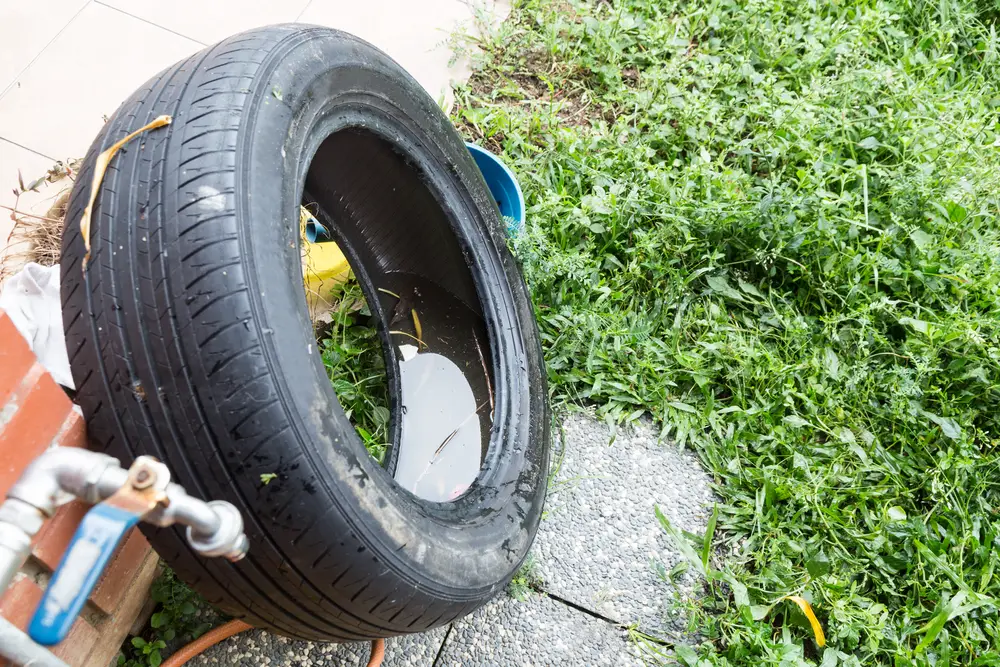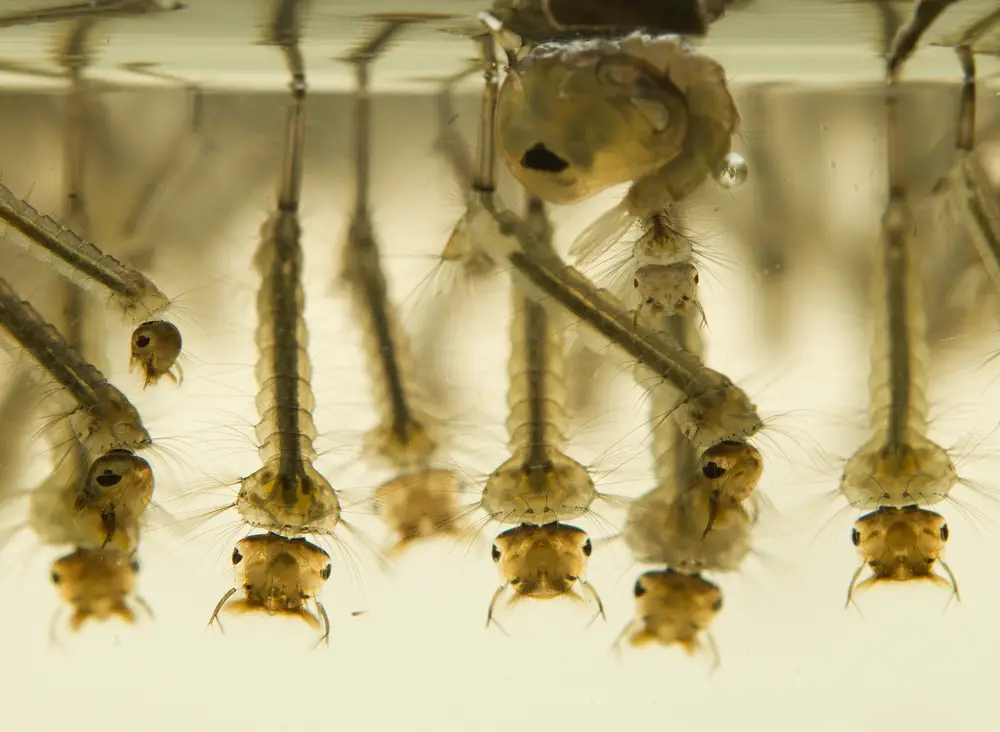Mosquitoes can be quite a nuisance during the warm months, causing itchy bites and spreading diseases.
To combat these pesky insects, many people turn to various methods of control.
Quick Answer:
Epsom salt (magnesium sulfate) isn’t an effective method for killing mosquito larvae. Larvae thrive in stagnant water, regardless of its salt content. For mosquito control, remove standing water sources, introduce natural predators like dragonflies or use larvicides formulated to target mosquito larvae without harming other wildlife.
Epsom salt, or magnesium sulfate, is a natural compound commonly used for its therapeutic effects, such as soothing sore muscles and promoting relaxation.
Epsom Salt and Mosquito Larvae
Epsom salt, also known as magnesium sulfate, is a widely used household product. It is commonly used for gardening, bathing, and other purposes.
Mosquitoes are pesky insects responsible for spreading diseases such as dengue, malaria, and Zika. In their life cycle, mosquito larvae are an aquatic stage that takes place in standing water. Controlling their growth and development can help reduce the population of adult mosquitoes and minimize the spread of diseases.
Epsom salt is not specifically designed to kill mosquito larvae, but some people have tried using it for this purpose. The idea is that the high concentration of magnesium and sulfur in Epsom salt can create an unfavorable environment for the larvae, disrupting their growth and development.
Adding Epsom salt to standing water where mosquito larvae are present may show some effect on their survival. However, the amount needed could vary depending on multiple factors such as water volume, temperature, and larval concentration.
To achieve the desired effect, you might need to add a generous amount of Epsom salt, which could potentially harm your plants and other aquatic life.
Although Epsom salt is not a guaranteed solution to eradicate mosquito larvae, it can still help in deterring mosquitoes from laying their eggs in the first place. Epsom salt can act as an irritant to mosquitoes, making it less appealing for them to choose that location.
Keep in mind that Epsom salt should not be considered a standalone solution to control mosquito larvae. There are other methods and products designed specifically for this purpose, such as larvicides, mosquito dunks, and proper water management.
Practicing integrated mosquito control, including removing standing water, will be more effective in addressing mosquito larvae populations.
Effectiveness of Epsom Salt
Epsom salt, which is actually magnesium sulfate, has a myriad of uses, including gardening, health remedies, and relaxation. But when it comes to dealing with mosquito larvae, the effectiveness of this salt is rather limited.
While Epsom salt might help marginally in discouraging the growth of algae in standing water, which in turn might make the area less habitable for mosquito larvae, it’s not a powerful agent against these creatures.
Unlike other household substances like oil and vinegar that might create a barrier on the surface of the water, making it difficult for larvae to breathe, Epsom salt doesn’t have that property.
Regarding the health and environment concerns, Epsom salt is generally considered safe, as it does not have any harsh effects on flora and fauna. However, it’s important to remember that Epsom salt is not a registered larvicide or insecticide, so it might not be the optimal choice for controlling mosquito populations.
To effectively target mosquito larvae, it is better to look into the use of bacteria, such as Bacillus thuringiensis israelensis (Bti), a naturally occurring bacterium that specifically targets mosquito larvae without causing harm to other organisms in the ecosystem. Bti products are available and easy to use, making them an excellent alternative to Epsom salt.
Alternative Methods to Control Mosquito Larvae
If you’re looking for ways to control mosquito larvae without using Epsom salt, there are several alternative methods available. These methods are effective, environmentally friendly, and safe for use around your home.
- Dish soap: A few drops of dish soap can be added to standing water to kill mosquito larvae. The soap breaks the surface tension of the water, which prevents the larvae from breathing and ultimately drowns them. Be cautious with this method, as it may also affect other aquatic life in the area.
- Cinnamon oil: Cinnamon oil is a natural and eco-friendly alternative to chemical pesticides. Add a few drops of pure cinnamon oil to standing water, and it will kill the mosquito larvae within a few hours. This method is safe for use around children and pets, and it leaves behind a pleasant cinnamon scent.
- Bleach: In small amounts, bleach can be used to kill mosquito larvae. Add one tablespoon of bleach per gallon of standing water, and the larvae will die within a few hours. Be careful when using bleach, as it can be toxic to fish, plants, and other wildlife.
- Pest control: If you’re facing a major mosquito infestation, it might be time to call in professional help. Pest control companies can assess your situation, identify potential breeding sites, and apply targeted treatments to eliminate both adult mosquitoes and their larvae.
- Larvicide: Larvicides are chemicals specifically designed to control mosquito larvae. They come in various forms such as granules or liquid and can be added directly to standing water. Available at most home improvement stores, larvicides effectively kill mosquito larvae without harming other organisms.
Breeding Habitats of Mosquitoes
Mosquitoes lay their eggs in standing water, which becomes the perfect breeding ground for mosquito larvae. Therefore, to prevent mosquitoes from multiplying, it is essential to eliminate all sources of stagnant water in and around your home.
One common breeding site for mosquitoes is ponds. If you have a pond in your garden, make sure the water is regularly circulated and treated. Adding fish that eat mosquito larvae, like gambusia, goldfish, and koi, can also help keep the population in check.
Your garden may also have numerous other spots that can accumulate water, such as flowerpots, buckets, and wheelbarrows. Be sure to empty these items regularly and turn them upside down when not in use to prevent water from collecting.
Gutters can become clogged with leaves and debris, causing water to pool and create ideal conditions for mosquito larvae. Clean your gutters frequently and ensure they are well-maintained to avoid any blockage that leads to standing water.
Bird baths are attractive to both birds and mosquitoes. It’s important to clean and refill them every couple of days with fresh water to disrupt the mosquito breeding cycle. This practice will allow birds to continue enjoying the bath without encouraging mosquito proliferation.

Old tires often collect rainwater and become a harbor for mosquito larvae. Make sure to dispose of old tires accordingly or store them in a cool, dry place where they won’t accumulate water.
Safe Methods for Controlling Mosquito Larvae
Mosquitoes are annoying pests which can also transmit diseases. One essential step to reduce their population is eliminating mosquito larvae.
Here are some friendly and safe methods for controlling mosquito larvae in your yard.
Apple Cider Vinegar: Add apple cider vinegar to standing water to create an environment that is inhospitable for mosquito larvae. The larvae cannot survive in the acidic water, and it is safe for other wildlife and plants.
Fish: Some fish species, like guppies and goldfish, feed on mosquito larvae. By introducing these fish into your pond or other water sources, you can control the mosquito larvae population without using chemicals. Just make sure to choose fish that suit your climate and water conditions.
Mosquito Dunks: Mosquito dunks are doughnut-shaped products that contain Bacillus thuringiensis israelensis (BTI), a natural bacterium that is toxic to mosquito larvae but safe for other wildlife and humans. Simply place a dunk in standing water, and it will gradually release BTI, killing the larvae.
BTI: BTI stands for Bacillus thuringiensis israelensis, a type of bacterium that specific targets mosquito, blackfly, and fungus gnat larvae. You can buy BTI products in granule or liquid form. Applying BTI to standing water will kill the existing larvae and prevent the development of new ones. Plus, it’s safe for the environment and won’t harm beneficial insects or animals.
Prevention and Protection Strategies
Having a mosquito-free environment is crucial, and one way to achieve this is by preventing the breeding and growth of mosquitoes as well as protecting ourselves from these pests.
It is important to eliminate standing water, which serves as a breeding ground for mosquitoes.
Check your surroundings for items that can collect water, like buckets, old tires, and flowerpots. Empty out the water and keep them dry. If you have a rain barrel, ensure that it has a tight-fitting screen to prevent mosquitoes from laying eggs.
Another tactic is to use a repellent. There are various mosquito repellents available in the market that can be applied to skin, clothes, or camping gear.
Look for a repellent that has an active ingredient like DEET or picaridin for effective results. Additionally, burning citronella candles can also help deter mosquitoes in outdoor spaces.
Screening your home is another way to keep mosquitoes at bay. Install fine-mesh screens on windows and doors, ensuring that there are no gaps or tears. Repair or replace damaged screens to prevent mosquitoes from entering your living space.
Maintaining your lawn and reducing vegetation is also a significant step in prevention. Tall grass, weeds, and overgrown bushes can serve as hiding spots for these pests. Keep your lawn and landscaping trimmed to reduce places where mosquitoes can rest and breed.
For water that cannot be removed, like ponds, consider using chlorine bleach. A small amount of bleach can help control mosquito larvae, although it is crucial to follow dosage recommendations carefully, as too much bleach can harm aquatic life and plants.
Another solution for standing water is using extra virgin olive oil. Pour a thin film of oil on the water surface to suffocate mosquito larvae, but use it sparingly as it can also impact other organisms.
Importance of Controlling Mosquito Larvae
Controlling mosquito larvae is crucial to reducing the population of mosquitoes and minimizing the risk of mosquito-borne diseases. Mosquitoes are not only annoying with their bites, but they can also transmit serious diseases such as malaria, dengue, and Zika virus.
There are many different mosquito species, each with their unique breeding and feeding habits. Some prefer stagnant water while others lay their eggs in floodwater areas. Regardless of the species, it is important to implement effective insect control strategies to target their larvae and prevent the growth of adult mosquitoes.
Mosquito larvae are a significant source of food for various predators, such as fish, birds, and insects. Unfortunately, these natural predators cannot always keep mosquito populations under control, making it necessary for us to implement additional measures.
One way to control mosquito larvae is by using Epsom salt. Epsom salt may be an effective alternative to chemical insecticides because it can help to change the water’s chemistry, making it inhospitable for mosquito larvae.
While this method may not be as effective as other insecticides or larvicides, it may be suitable for smaller-scale applications such as backyard ponds or birdbaths.


